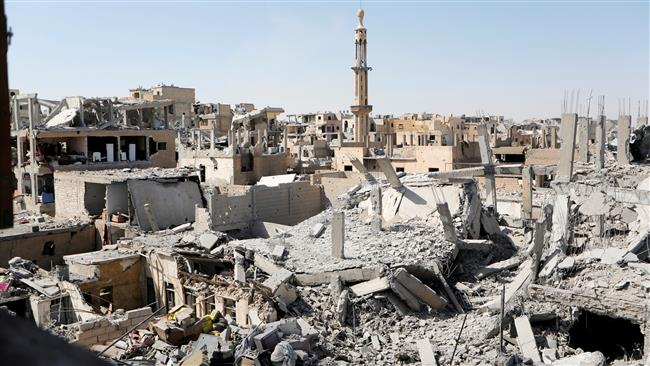
RNA - As a consequence, domestic and international attention has begun to turn toward stabilization and reconstruction. They all envision a postwar Syria in most parts of the country. Yet large sections of the Western community - including, critically, the United States and some EU member states - continue to reject the legitimacy of President Bashar Assad and his elected government.
The United States and its allies have given up on their proxy war on Syria, with which they had pushed for President Assad’s removal from power. And now reconstruction for them seems like the next battle to shape Syria’s political order. In fact, for backers of the terrorist groups and Syrian opposition, reconstruction funds are one of their last remaining tools to pressure the Syrian government. Some are now proposing convoluted schemes for how the West can rebuild Syria in spite of President Assad or how it can condition its reconstruction money on political concessions from the government.
In between, there are some governments that maintain that the West should never fund the reconstruction of post-ISIL Syria. This is not surprising. Perhaps, they have in mind what President Assad said in a high-profile speech back in August. He warned his adversaries that they would not negotiate their way to victory: “We won’t let enemies, adversaries, and terrorists, through any means, accomplish through politics what they failed to accomplish on the battlefield and through terrorism.”
Now the news is emerging that the West is taking President Assad at his word. Not that they ever wanted to rebuild a physically shattered and broken nation called Syria after deliberately destroying it via terror proxy forces and UN-illegal air war and occupation! The West, however, is in the know that Syria’s reconstruction (as maintained by President Assad) cannot be dictated or meaningfully shaped by Western donors - at least not to any satisfactory political ends. There are many humanitarian arguments for investing in reconstruction though. But in political terms, the bankrupt West does not have any intention to play a role in this game either.
The cost of Syria’s reconstruction will be immense – reports suggest between $200 billion and $350 billion, depending on the estimate. Experts say these sums are far beyond the capacity of Syria, or the ability of its Iranian and Russian allies. The burden of reconstruction, therefore, is expected to fall to a great part on the United Nations, as well as on multilateral institutions that are likely to take cues from their major donors, such as the World Bank.
As a way to justify the enormous sums, the regime changers and opposition backers have suggested that reconstruction money might buy political concessions. On September 21, a meeting of “like-minded” actors (including Saudi Arabia, the United States, and the EU) announced that “recovery and reconstruction support for Syria hinges on a credible political process leading to a genuine political transition that can be supported by a majority of the Syrian people.” They still seem to be unable to comprehend that majority Syrians have voted for Assad and stood behind him.
“Reconstruction funding is the biggest lever the United States and its allies might want to push for a political process,” says David Satterfield, a US State Department official. And according to British Foreign Minister Boris Johnson, “We have one big card left to play in a pretty poor hand and that is the cash we can provide for the reconstruction of Syria.”
This should be a wakeup call for the government in Damascus and the Syrian people to think twice before asking for major funds from certain Western nations to rebuild their country. They know and the whole world knows that “one big card left” means cash for regime change or redefining the regime-change campaign – something the United States, its Arab allies and proxy forces couldn’t accomplish on the battlefield and through terrorism after six years in the conflict.
And of course, other big problems remain. The Persian Gulf Arab states which supported various terrorist groups during the failed war will surely refuse if President Assad remains. But Russia, China and Iran will assuredly want to put up the cash for geopolitical reasons and on humanitarian grounds. Then it would be the Syrian opposition which would be cut off from the country’s reconstruction, as well as the US, the EU and of course the Persian Gulf Arab states.
Long story short, the war on Syria has failed and it won’t continue forever. Syria and the international community alike sorely need a pragmatic rebuilding program that seizes every opportunity to build bridges and restore normalcy in the country whenever and wherever possible. Without one, the refugee crisis and terrorism threat cannot be addressed.
847/940